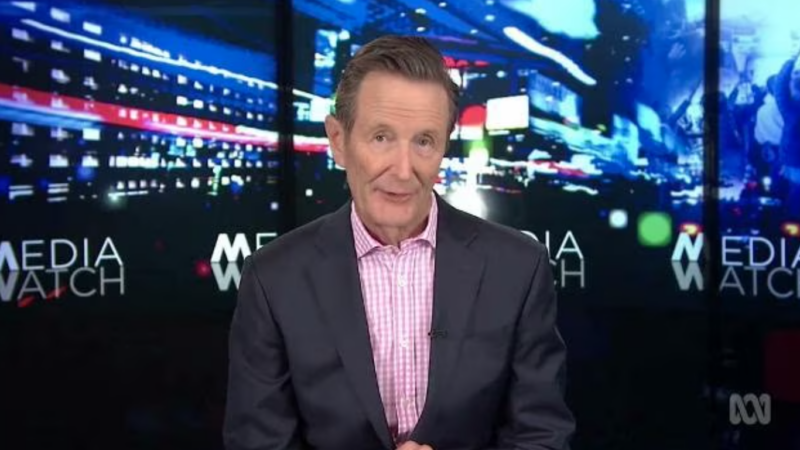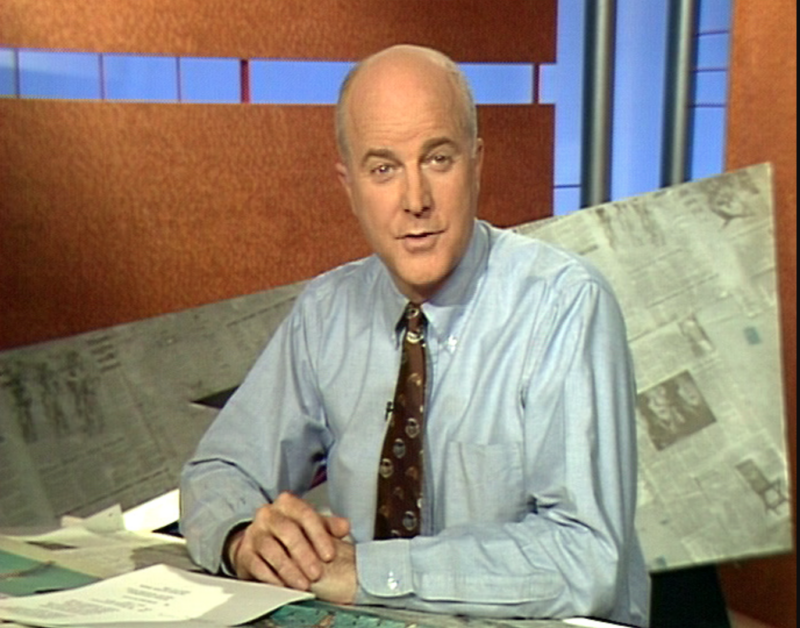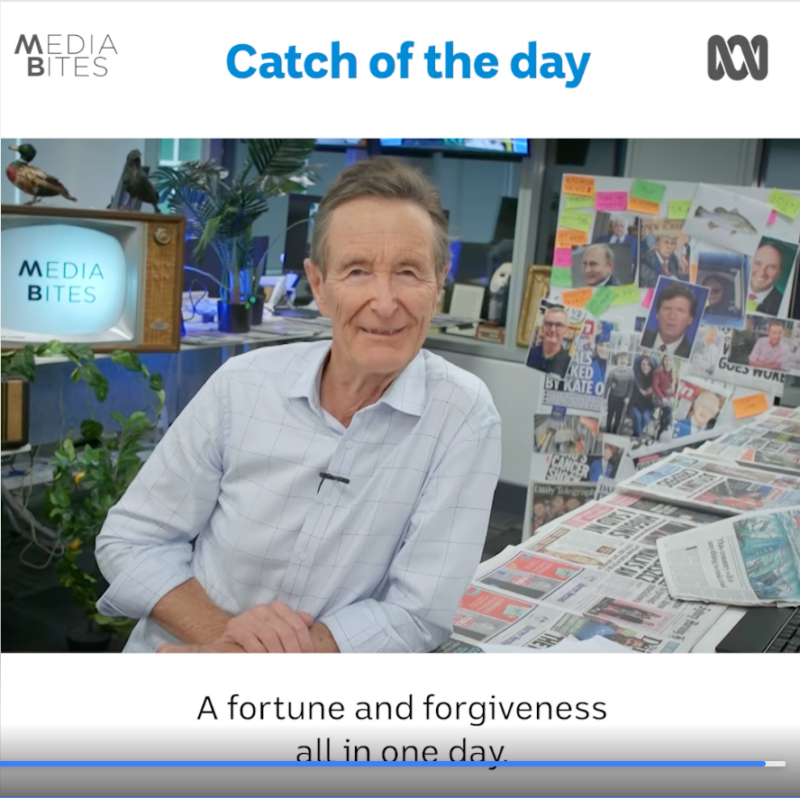Let Paul Barry put Media Watch to bed
Paul Barry announced during the week that he is leaving ABC’s Media Watch, the show he has fronted for 11 years.
The ABC has confirmed the show will continue after Barry serves out the rest of 2024, and they will announce a new host in due course (hot take: Waleed will be gunning for this role).
“The award-winning journalist will leave the show with a track record of independent commentary, analysis and robust discussion about the media industry and its ethics – or lack thereof,” a spokesperson for the ABC said of Barry’s departure.

Barry said, of his own stint: “It’s a great privilege to host Media Watch and I’ve enjoyed it enormously. But I’ve been in the hot seat for 11 years and it’s time to give someone else a go.”
“I’m sure the program will go on to great things without me”.
Let’s examine that last statement.
Media Watch launched in 1989, the brainchild of Stuart Littlemore, who hosted the show for its first nine years. As both a media lawyer, and a BBC journo based in London during the late 1960s – back when the bleedin’ bobbies were bustin’ Beatles for drugs, innit? – he had a uniquely suitable set of skills for the role of Media Watch host – because, of course, he invented the role.
“I want to show people the problems – not tell them”, he said, of his initial motivation to launch a television show examining the media, which doesn’t seem like a novel idea these days, due largely in part to the success of Media Watch.
But traditions, by their very nature, can often become outmoded, unnecessary, or inappropriate.

After Littlemore left the show in 1997, Media Watch cycled through five different hosts over the next 15 years, the longest-serving of which was Jonathan Holmes, a British journalist who spent the 70s at the BBC, the 80s and 90s at the ABC, and who lasted five-and-a-bit years as Media Watch host before handing over the reins to Paul Barry – who, with 11 years under his belt, has become the longest standing host in Media Watch’s 35-year run, and the only one to have written a 638-page tome on Kerry Packer as far as I can tell.
Barry started at Media Watch in 2013, which was an interesting year for news.
In 2013, Facebook’s algorithm started heavily favouring news articles on its platform. Nascent news/culture publications (some of which I wrote for) that were once posting their articles to their own small readerships were suddenly finding their content flung all over Facebook, in an algorithmic bid by the platform to be taken seriously as a source of actual smart-people stuff, and not the dumb MySpacey stuff that sank MySpace.
This resulted in floods of traffic to these sites, many of which have since grown into the biggest media properties in the country.
In hindsight, this seems like a tipping point for the Australian media – which was already expanding rapidly with the growth of social media, of online advertising opportunities, of international reach, and now, with Facebook, independent publishers were suddenly distributing written media (content!) on a level playing field with the Murdochs and Packers and ABCs of the world.
Since then, everything has continue to change. The major media corporations are focused on streaming and podcasting and aren’t even the major media corporations anymore. Those are overseas entities, Netflix and Disney and Apple and Google and Facebook and Spotify and Kanye West and Kim Kardashian and anyone with a large enough distribution system or a megaphone loud enough that everyone else will be their distribution system.
Imagine pitching Media Watch today.
You walk into the ABC, and propose a 15-minute TV show—at this point, an ABC exec is already stopping you, and asking things like, “so a web short?”
You explain it’s a 15-minute weekly show, on free-to-air, at 9.15pm on a Monday, that provides viewers with – actually, let’s use the ABC’s own words “independent commentary, analysis and robust discussion about the media industry and its ethics – or lack thereof.”
Of course, you’ll focus primarily on Nine, and News Corp, and Ten and Seven, and occasionally you’ll shine a weak spotlight into your own backyard.
Here’s what the ABC executive (aggressively male, shirt tucked in unevenly, Lynx Africa) would say to you about that show pitch:
“The News Corp and Nine mastheads are firing shots at each other, and at the ABC, and at Ten and at Seven, on an hourly basis these days. There have been numerous high-profile lawsuits in Australian media within the last calendar year, all of which played out across tens of thousands of articles, hundreds of think-pieces, statements, allegations, lies, #fakenews, newsreels, and play-by-play-by-plays. There’s also all our own mess, too — ‘let he without sin’ — like the Latouff lawsuits and sacking Kingsmill and all those other newsroom redundancies, and Ita running this place like a corporation, and we let Nine get their hands on Seachange and they ruined it, and here’s the latest Edelman survey of Australians (at this point, he is waving a manila folder at you).
“Check out this bit,” he says, opening the manila folder. “‘The media continued to be the most distrusted institution in Australia. Only 38% of survey respondents said they trusted its institutions, a fall of five points.’
“Five points! Accounting for population growth, that five points represents 1.3 million Australians who trusted our media in 2023 and don’t in 2024. 1.3 million Australians! And you wanna do a 15-minute weekly show that captures all of this! Fucking quaint notion!
“Plus, this Media Watch idea should be a YouTube short.”
It wouldn’t float because it doesn’t float. Not in 2024.
The ratings are decent enough – last Monday night, 650,000 people tuned in, enough to make it the 19th most-watched free-to-air show that night – but it’s getting tougher to justify the cost of a 15-minute weekly show staffed by a dozen public servants.
That ABC exec I made up is correct, though. Media Watch, with its smash-cut graphics, cheesy voice overs, and strident man monologuing on the sins of others was the proto viral YouTube video. FriendlyJordies is (was?) basically cosplaying Paul Barry, let’s face it. ABC knows it – that’s why they also produce Media Bites, a series of 2-3 minute videos focused on one target and one topic.
Now we’re talking. The internet.
Away from the affectation of the ABC news desk, perched like a wag on a suspiciously print-media-heavy desk (which will be making Kondo cohorts have an anxiety spike right about now), Paul Barry seems more natural, less grandstanding. This format works!

That ABC exec I made up was also correct about the falling trust in media – including the ABC.
Public trust in the ABC has been dwindling for some time, according to the ABC itself, which conducts polls three times per year “among a nationally representative sample of people aged 18-75 years” in order to gain “insights into community perceptions and beliefs about the value of the ABC’s contribution to Australian society”.
Last year, 79% of Australian adults aged 18 – 75 years said they trusted the information that the ABC provides (or, at least, they told the ABC they do).
This has dropped from the 81% who trusted the ABC in 2019, but remains higher than levels of trust in commercial radio (60%), commercial TV (58%), newspaper publishers (58%), Facebook (32%), and Karl Kennedy from Neighbours (0%).
The ABC is unlikely to become more trusted for its news gathering/reporting, either, given this time last year, the broadcaster made 140 redundancies including high-profile political editor, Andrew Probyn, with 41 jobs were cut from the news division, including deep cuts to staffing at Australian Story, and Four Corners – the ABC’s two flagship investigative news programs.
They’ve also axed The Drum, and recently removed Q+A from air until August, and replaced it with a sports chat show hosted by Catherine Murphy and Tony Armstrong, two of the most likeable ABC personalities.
That’s what we want from our tax dollars. Not the ABC tssking other media companies while it continuously fails the public that pays to keep it afloat.
Media Watch had an incredible 35-year run, but that length of time didn’t save Richard Kingsmill, who enjoyed a similar 35-year innings at the national broadcaster.
Why let Media Watch dribble through a on-air few host auditions, and a further loss of relevance?
Let Barry land the plane rather than allowing it to run out of fuel.
Plus, it should be a YouTube show. People love those!
Enjoy your weekend.




 Linkedin
Linkedin
Wow, could this article prove any more positive, why a show exactly like Media Watch really is needed?
User ID not verified.
A not so jolly post Nathan … but I hope you feel better.
User ID not verified.
Not only does it regularly win its slot, it’s not afraid to criticise the ABC, hence why it’s only answerable to the Board and not the Head of News. This just reads like Mr Jolly is afraid of independent scrutiny of the media. No doubt he’d love more brand deals, native advertising and PR news stories on the nightly news.
User ID not verified.
No way on earth, the program should be scrapped… Literally now at the present time, more than ever – we need accountability and calling out of the outlets…
User ID not verified.
Our favourite show, and the one and only FTA show that we look forward to watching on a weekly basis (old school style). We will miss you Paul Barry – thank you so much for all of your fantastic contributions. Media Watch is the one program that absolutely must stay on-air, integrity intact!
User ID not verified.
The need for a show like Media Watch is ever growing. This article is evidence of that.
User ID not verified.
Have your say